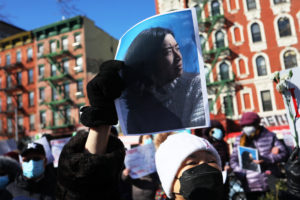‘Decolonizing Politics’ and ‘Reconsidering Reparations’ are books that will inspire a wide range of readers.
How do race and racism underpin contemporary politics? How do racist understandings of the world affect the topics political scientists examine and the ways they study those topics? Political science has a long history of excluding people of color and not taking seriously different ways that knowledge is produced and understood in different parts of the world.
Some of the most important thinkers in the field denied the full humanity of certain populations. Social scientists studying democracy, for instance, framed only certain racial groups as capable of “orderly” political behavior and “competent” citizenship. The study of international relations shaped European imperial expansion and governance, centering the global north as the “standard of civilization.”
Two new books shed light on these histories and practices, and make the case for a better way forward.
In “Decolonizing Politics: An Introduction,” international relations scholar Robbie Shilliam examines how these racial foundations have structured scientific inquiry and policy practice. Delving into both academic and political developments, “Decolonizing Politics” is an accessible, engaging overview of many eras of political thought and action. It takes readers on a journey “from the offices of the powerful to the movements of the oppressed.”
In order to understand how race and racism have organized politics and political research, Shilliam requires us to decenter well-known and widely recognized scholars. Each chapter juxtaposes influential thinkers — based most often in the global north — and the racial foundations of their work against perspectives and debates simultaneously unfolding in the global south.
Take the modernization theorists of the mid-20th century, for instance. This group of well-known social scientists, funded partly by the U.S. government, played an important role in shaping the policies and practices that aimed to raise living standards across the world. They argued that industrialized democracy — the dominant system of the global north — was the ideal type to which other countries should aspire. Countries — particularly those in the global south — should seek to “modernize” their economies and political systems to meet this standard.
Don’t miss any of TMC’s smart analysis! Sign up for our newsletter.
But the modernizers were not neutral observers. Their research agenda was embedded in the Cold War’s global struggle between capitalism and communism. The U.S. government subsequently used these narratives to help legitimize bloody counterinsurgency programs to destabilize unfriendly regimesin the name of “modernization.” This approach to human development continues to influence research — and development interventions — today.
The modernizers were not the only thinkers working at that time, however. Based at Tanzania’s University of Dar-es-Salaam, John Saul, Giovanni Arrighi and Walter Rodney argued that globally unequal relations of power and exploitation delivered development to some — but not to others. They saw their work as reparative, locating the solution to underdevelopment in struggles against these systems, an ethical and political project that would be truly transformative for populations at the peripheries of global power.
This is the “art of decolonizing knowledge,” Shilliam contends — paying attention to ideas and perspectives on the margins. This approach requires us to think about how those margins and centers came to be, and their effect on political life and the study of politics. The arguments made in “Decolonizing Politics” have significant implications for how we approach scientific inquiry and understand its relationship to political practice.
With a similar focus on racist political structures and inequality, philosophy professor Olúfémi O. Táíwò’s new book, “Reconsidering Reparations” places arguments for reparations within a view of history he calls the “global racial empire.” This approach incorporates the ways that race and class intersect with other identities like gender, settler status, ethnicity, religion and ability.
Professors: check out all TMC’s latest index of topic guides
Táíwò argues for a “constructive view” of reparations that accounts for local, national and international consequences of the global racial empire. This view is specific and forward-looking but built on a detailed historical understanding of how development and distribution constituted life for marginalized people. Táíwò brings Pan-Africanist and Black writers like Oliver Cox, Nkechi Taifa and Walter Rodney into conversations with the dominant thinkers in political philosophy, like John Rawls.
Though “Reconsidering Reparations” focuses on histories of unequal distribution, its highlight is the climate justice chapters. Táíwò explains, “it’s not that every aspect of today’s global racial empire is rooted in the impacts of climate change. But every aspect of tomorrow’s global racial empire will be … and it will reverse the gains toward justice that our ancestors fought so bitterly for.” These ancestors inspire present action to Táíwò. They remind us that justice struggles are difficult and long. But they can bear tremendous fruit.
Each of these books will inspire a wide range of readers. Both authors note that there is sometimes a powerful imperative to justify one’s work. They refuse to do so. As Táíwò puts it, “racism keeps you answering other people’s questions.” Instead, they demonstrate how to carefully interrogate topics that matter to a scholar or community.
Shilliam takes less-heard voices as the starting point for rethinking scientific agendas and policy practices. Táíwò asks “what forms of social life are compatible with our flourishing? What must our economies look like to respond to our social problems?”
Táíwò and Shilliam end on distinctly optimistic and empowering, solutions-oriented notes. Táíwò calls his approach “acting like an ancestor.” He provides a list of targets and tactics for climate reparations, as well as specific examples of organizations and activists in each area. These include unconditional cash transfers, global climate funding, ending tax havens, increasing community control, supporting citizen science and “bargaining for the common good” by knitting together more workers organizations and community organizations in response to climate initiative actions.
Shilliam proposes fewer specifics but encourages us to “be the agents of repair” in solidarity with those impacted by imperial legacies. There is both a sense of urgency but also an expansive possibility that there are activists and intellectuals whose ideas we have yet to interrogate who could guide us, and ancestors who have laid out a path to a better future.
Ankushi Mitra (@ankushi_mitra) is a PhD student at the Department of Government at Georgetown University. She studies citizenship, migration, and the political economy of development in Africa.
Lahra Smith (@LahraSmith1) is a political scientist who studies citizenship, migration and political development in Africa. She is an associate professor in the Walsh School of Foreign Service and the Department of Government at Georgetown University and the director of the African Studies Program.
Read more in this summer’s APSRS:
Two new books take different roads to understand South Africa
What does it take to build up women’s rights after war?
No, Batman didn’t save the Congo, and other book reviews
Nigeria’s harsh police culture grew from colonial abuses
‘Islamic State in Africa’ explores nine militant Islamic groups
Apartheid casts a long shadow across South Africa
Paul Farmer’s last book teaches still more about pandemics
‘Born in Blackness’ is a compelling, unforgettable read
Find all the books in our ninth African Politics Summer Reading Spectacular here.




